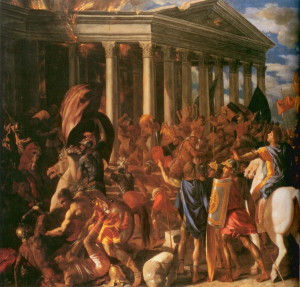Destruction of the Second Temple in 70 C.E. – Tisha B’Av
Toward the end of 69 or the beginning of 70, Vespasian appointed Tiberius Julius Alexander to the staff of his son Titus, who was in charge of the war against the Jews. In Josephus’ eyes, this was a distinction and a token of gratitude on the emperor’s part toward the governor “because he had been the first to welcome the dynasty just arising and with splendid faith had attached himself to its fortunes while they were still uncertain.” As military adviser to Titus, he (e.g. Tiberius) was chief of staff at the time of the council of six generals, who were to decide the fate of the Temple. He voted against its destruction, following in this the wishes of Titus himself who, Josephus pretends, “would not under any circumstances burn down so magnificent a work; for the loss would affect the Romans, inasmuch as it would be an ornament to the Empire if it stood” (The Jewish War 6, 241). We know what happened: the Jews renewed their attack on the Romans, who pursued them to their sanctuary where a Roman soldier, without waiting for orders, yielded to panic and threw a firebrand into the Temple, causing the fateful conflagration despite the valiant efforts of Titus to prevent it from spreading. Josephus concluded that the Temple had been destroyed against the wishes of Titus, and that the origin of the fire and its cause were to be attributed to the Jews themselves.
Since scrupulousness is rarely the key to continued success in politics, we may well ask whether Tiberius was bedeviled with remorseful feelings when his ambitions and his acts came into conflict with his Judaic roots. He may not have been very troubled by the oath he took on assuming his military duties, the first step in his administrative career, which did not exactly correspond to the prescriptions of the Jewish religion: it was this which prompted Josephus to say that Tiberius “did not remain faithful to the customs of his (e.g. Jewish) forefathers” (Jewish Antiquities 20, 100).
Source: Joseph Mélèze Modrzejewski. The Jews of Egypt. (p. 187, 189, 190)




